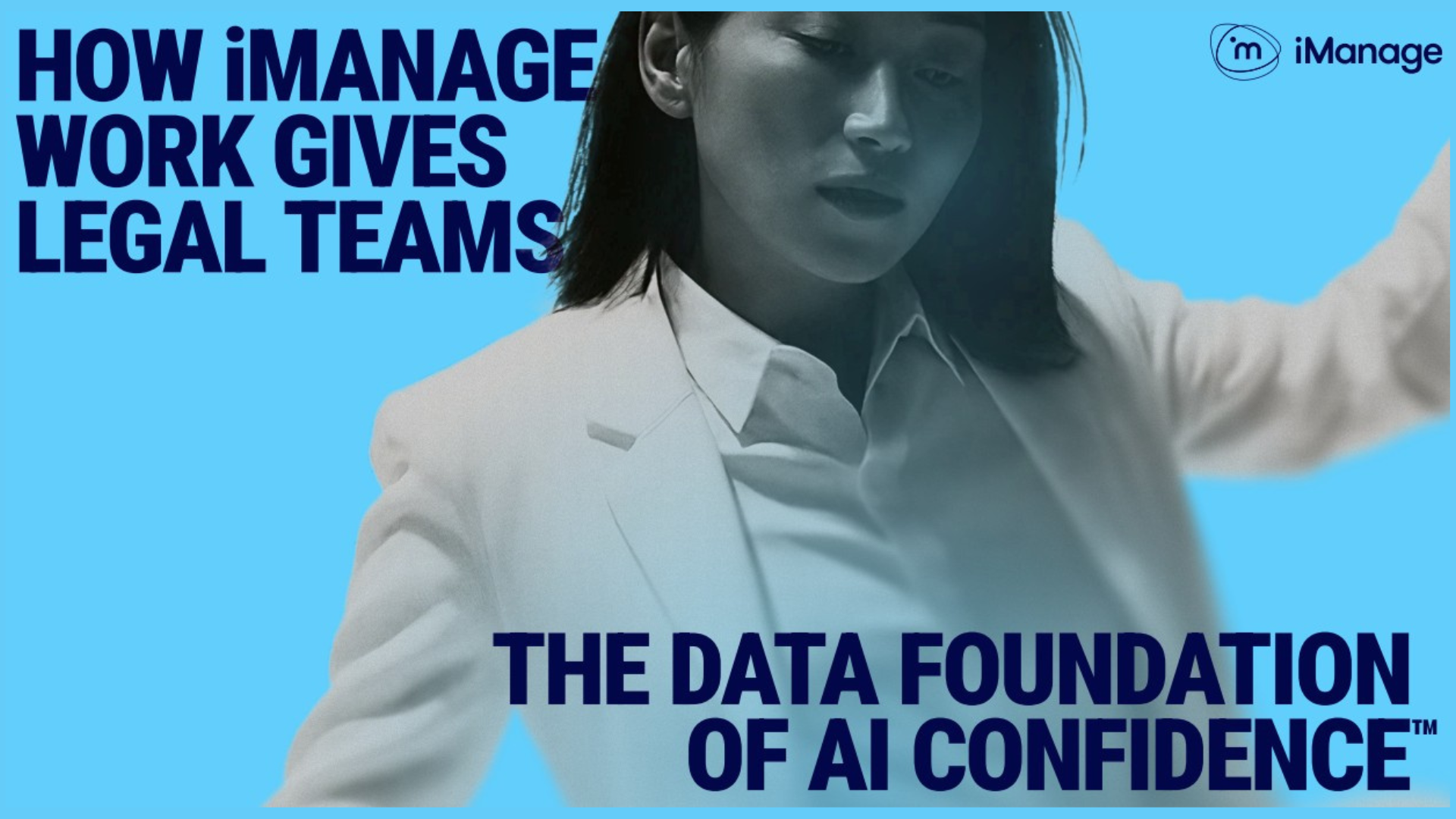Sponsored by iManage
How AI can help rather than hinder knowledge workers in the legal profession
AI won’t replace lawyers — it empowers them. Free from routine tasks, legal pros can focus on strategy, judgment, and client success

The legal profession is built on knowledge — deep, nuanced, and often complex. Lawyers, paralegals, compliance officers, and legal researchers are knowledge workers whose value lies in their ability to interpret laws, craft arguments, and make strategic decisions.
As artificial intelligence (AI) becomes more embedded in legal workflows, many fear it could displace or diminish these roles. But when used with confidence, AI can empower legal professionals rather than hinder them by enhancing their capabilities and freeing them up for higher-value work — without compromising ethics, judgment, or professional standards.
Understanding the role of knowledge workers in the legal field
Knowledge workers in the legal field are not just information processors — they are interpreters, strategists, and advisors. Their work involves legal research and analysis, reviewing and interpreting complex documents, navigating regulatory frameworks, advising clients and stakeholders, and drafting contracts, pleadings, and opinions.
These tasks require critical thinking, contextual awareness, and ethical reasoning — skills that AI cannot replicate. But AI can assist, accelerate, and augment these tasks in powerful ways.
“In high-volume litigation matters, a complaint response system reduced associate time from 16 hours down to 3-4 minutes,” Robert Couture, senior research fellow at the Center on the Legal Profession and the former executive director of McGuireWoods LLP, wrote in a February 2025 Harvard Law School article.
“Lawyers have seen productivity gains greater than 100 times. Using AI for the automation of initial drafting has demonstrated not only time savings but also increased accuracy.”
How AI helps legal knowledge workers
There are many ways AI supports legal professionals in their daily work. A few examples include:
- Accelerating legal research: Traditional legal research is time-consuming. AI-powered platforms like Westlaw Edge, Lexis+, and Casetext use natural language processing (NLP) to understand queries and surface relevant cases, statutes, and commentary faster and more accurately. Semantic search enables lawyers to ask questions in plain English, and AI can highlight key information, summarize rulings, and suggest related precedents. This doesn’t replace legal research — it enhances it by reducing the time spent searching.
- Streamlining document review: AI can analyze contracts, non-disclosure agreements (NDAs), and other legal documents to extract clauses, flag risks, and compare terms. AI can quickly identify missing or unusual provisions and automate first-pass reviews in mergers and acquisitions (M&A), compliance, or litigation. This frees up lawyers to focus on negotiation, strategy, client communication, and other higher-value work.
- Enhancing drafting and writing: Generative AI tools can assist in drafting contracts, memos, and emails. While these tools shouldn’t be used for final versions without review, they can generate boilerplate language, suggest clause variations, and format standard documents for different purposes.
- Improving knowledge management: Law firms and legal departments generate vast amounts of internal knowledge — templates, precedents, memos, and insights. AI can organize and tag documents automatically, surface relevant internal content based on context, and enable conversational search across firm knowledge bases, ensuring that institutional knowledge is accessible and actionable.
- Supporting compliance and risk monitoring: AI can monitor regulatory changes, flag potential compliance issues, and analyze patterns in litigation or enforcement. AI can track changes in laws across jurisdictions and help identify emerging risks before they escalate, allowing legal teams to be proactive rather than reactive.
Addressing common objections
Despite these use cases and benefits, many legal professionals remain skeptical about AI.
MyCase found that 60% of law firms are unsure when they’ll implement AI, with 42% citing mistrust in AI and ethical concerns, 41% waiting for AI to become more reliable, and 36% concerned about privilege misuse. Some common concerns include:
- “AI will replace lawyers.” AI is a tool — not a substitute for legal judgment. It can handle repetitive tasks, but it cannot interpret nuance, understand context, or make ethical decisions. “The ethical use of generative AI is predicated on the understanding that this technology is a legal assistant, not a lawyer,” Thomson Reuters notes.
- “AI makes mistakes.” Yes, but the key is to use AI as a first-pass assistant, not a final arbiter. Human oversight is essential. With proper validation, AI can help identify and reduce errors that humans might otherwise miss.
- “AI is a black box.” Some AI tools lack transparency, but many vendors now offer explainable AI. Legal professionals should demand audit trails, confidence scores, and the ability to override or correct outputs.
- “AI threatens confidentiality.” Security is a valid concern. Many AI vendors offer encryption, access controls, data residency, and other security measures to ensure confidentiality. Firms must thoroughly vet AI tools and establish appropriate governance.
How to integrate AI with confidence
The following best practices help legal teams use AI with confidence to ensure it helps, rather than hinders them:
- Start with clear use cases. Identify repetitive, time-consuming, or error-prone tasks. Pilot AI tools in these areas first, for example, contract review, research, or compliance monitoring.
- Carefully review and assess the surrounding infrastructure. For example, is your document management system (DMS) fit for purpose? Does it set you up for success with AI?
- Involve knowledge workers early. Lawyers, paralegals, and support staff should be involved in tool selection, testing, and training. Their feedback ensures the tool fits real-world workflows and use cases.
- Establish governance and ethics protocols. Create policies for acceptable AI use, including validation procedures, data privacy standards, ethical guidelines, and roles and responsibilities.
- Invest in training and change management. AI adoption requires cultural change. Provide training not just on how to use AI tools, but on why they matter. Track metrics like time saved, accuracy improved, or risk reduced, and use these insights to refine workflows and expand adoption.
By automating the mundane, surfacing the relevant, and enhancing the strategic, AI empowers legal professionals to do what they do best: think critically, act ethically, and serve clients.
The key is thoughtful integration, ongoing education, and a clear-eyed understanding of what AI can — and cannot — do. With the right approach, AI becomes a trusted ally in the pursuit of justice, efficiency, and insight.
Sign up today and you will receive a free copy of our Future Focus 2025 report - the leading guidance on AI, cybersecurity and other IT challenges as per 700+ senior executives

Lawrence Miller, CISSP, has worked in information security and technology management for more than 25 years.
He received his MBA in Supply Chain Management from Indiana University and has earned numerous technical and professional certifications throughout his career.
He is currently working as an IT security solutions consultant. He’s previously worked as the vice president of IT for a major Verizon reseller, director of IT and e-commerce for a retail merchandising company, and IT operations manager for a top 100 U.S. law firm.
-
 Microsoft unveils Maia 200 accelerator, claiming better performance per dollar than Amazon and Google
Microsoft unveils Maia 200 accelerator, claiming better performance per dollar than Amazon and GoogleNews The launch of Microsoft’s second-generation silicon solidifies its mission to scale AI workloads and directly control more of its infrastructure
-
 Infosys expands Swiss footprint with new Zurich office
Infosys expands Swiss footprint with new Zurich officeNews The firm has relocated its Swiss headquarters to support partners delivering AI-led digital transformation
-
 The Data Foundation of AI Confidence
The Data Foundation of AI Confidencewhitepaper
-
 Tired of legal AI tools that overpromise but underdeliver? The secret to success is in your firm’s data
Tired of legal AI tools that overpromise but underdeliver? The secret to success is in your firm’s dataSponsored Don't let legal AI tools overpromise and underdeliver: the secret to success isn't the software, but building a secure, stable, and connected data foundation that transforms your firm's complex, siloed information into structured knowledge.
-
 Yes, legal AI. But what can you actually do with it? Let’s take a look…
Yes, legal AI. But what can you actually do with it? Let’s take a look…Sponsored Legal AI is a knowledge multiplier that can accelerate research, sharpen insights, and organize information, provided legal teams have confidence in its transparent and auditable application
-
 What can AI do to empower those working in the legal sector today, tomorrow, and beyond?
What can AI do to empower those working in the legal sector today, tomorrow, and beyond?Supported AI is transforming the legal profession — from streamlining today’s workflows to shaping tomorrow’s strategies. For firms, the choice is clear: embrace trusted AI tools now or risk falling behind in a rapidly evolving landscape
-
 AI in the legal sector: How to separate the signal from the noise
AI in the legal sector: How to separate the signal from the noiseSupported From contract review to litigation strategy, AI promises efficiency. But with so much noise in the market, legal professionals must know how to spot tools that deliver real value
-
 AI legal confidence: What is it and how do you get there?
AI legal confidence: What is it and how do you get there?Supported AI is reshaping legal practice, but doing so successfully comes down to building trust and confidence...
-
 Legal professionals face huge risks when using AI at work
Legal professionals face huge risks when using AI at workAnalysis Legal professionals at a US law firm have been sanctioned over their use of AI after it was found to have created fake case law.
-
 The future of AI in the legal industry
The future of AI in the legal industryIn-depth It’s an industry that can be traced back to ancient Greece and Rome but how will artificial intelligence catapult the legal profession into the 21st century?
